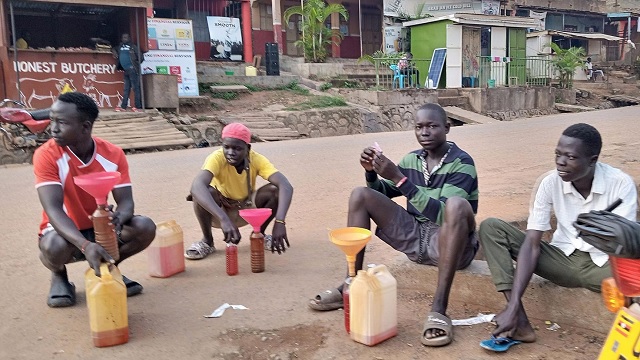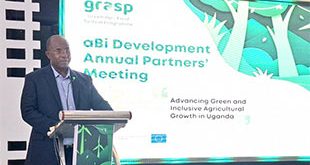
Arua, Uganda | THE INDEPENDENT | Fuel stations in Arua are crying foul over the increasing number of fuel vendors on the streets of the city, something they say is affecting their sales.
They argue that their businesses are on the verge of collapse due to the rise in the number of fuel dealers on the streets and yet they pay a lot of taxes to remain relevant in business.
Currently, almost every junction and boda-boda stage within the city has roadside fuel dealers. Others operate near the entrance of designated fuel stations, which often makes the would-be buyers shun fuel sold from the stations and go for that sold on the street.
Most of the dealers who are mainly youth operate openly, while others operate clandestinely due to the fear of being arrested by Uganda Revenue Authority officers.
Bosco Abani, the manager of Moise fuel station located along Ediofe Cathedral road says their daily sales have drastically fallen due to the presence of cheap fuel being sold on the streets. Abani says they used to sell 1000 liters of fuel in a day but nowadays their daily sales range between 300 to 400 liters.
Osman Noor, the manager of Hass petroleum along Pakwach road in Arua city, notes that most boda boda cyclists now prefer to buy fuel on the streets which has greatly affected their daily sells. He attributes Arua being nearer to the border with Democratic Republic of Congo (DRC) where the sellers smuggle the fuel from.
“It has affected us a lot, especially our daily fuel sales,” said Osman. “Most boda bodas now have abandoned fueling at the station due to the relatively cheaper fuel being sold on the streets,” said Osman.
Ivan Ejidra, a bodaboda cyclists in the city claims the major challenge of the fuel sold on the street is that it is too light and burns so fast compared to the ones at the fuel stations. He has advised his colleagues to abandon the fuel sold at the roadside as it may spoil their engines.
“The fuel I used to buy for the OPEC boys gets finished very fast compared to the one from the fuel station, and some of these dealers mix the petrol and kerosene which kills the engine of the motorcycle easily,” said Ejidra.
A liter of petrol sold on the streets costs 6,000 shillings while from the fuel stations the same quantity ranges between 6,400 shillings and 6,860.
Roadside fuel vending is not a new phenomenon in Arua city and West Nile at large. In the 1990s and 2000s, the group which was commonly known as OPEC boys controlled the fuel market in the area.
URA law enforcement personnel at Arua customs service office have launched an operation to arrest and prosecute roadside fuel dealers. According to police, so far nine people have been arrested during the ongoing operation.
According to the URA recovery report on smuggled goods, the authority loses between 500 million and one billion shillings a month across the West Nile region.
*****
URN
 The Independent Uganda: You get the Truth we Pay the Price
The Independent Uganda: You get the Truth we Pay the Price



